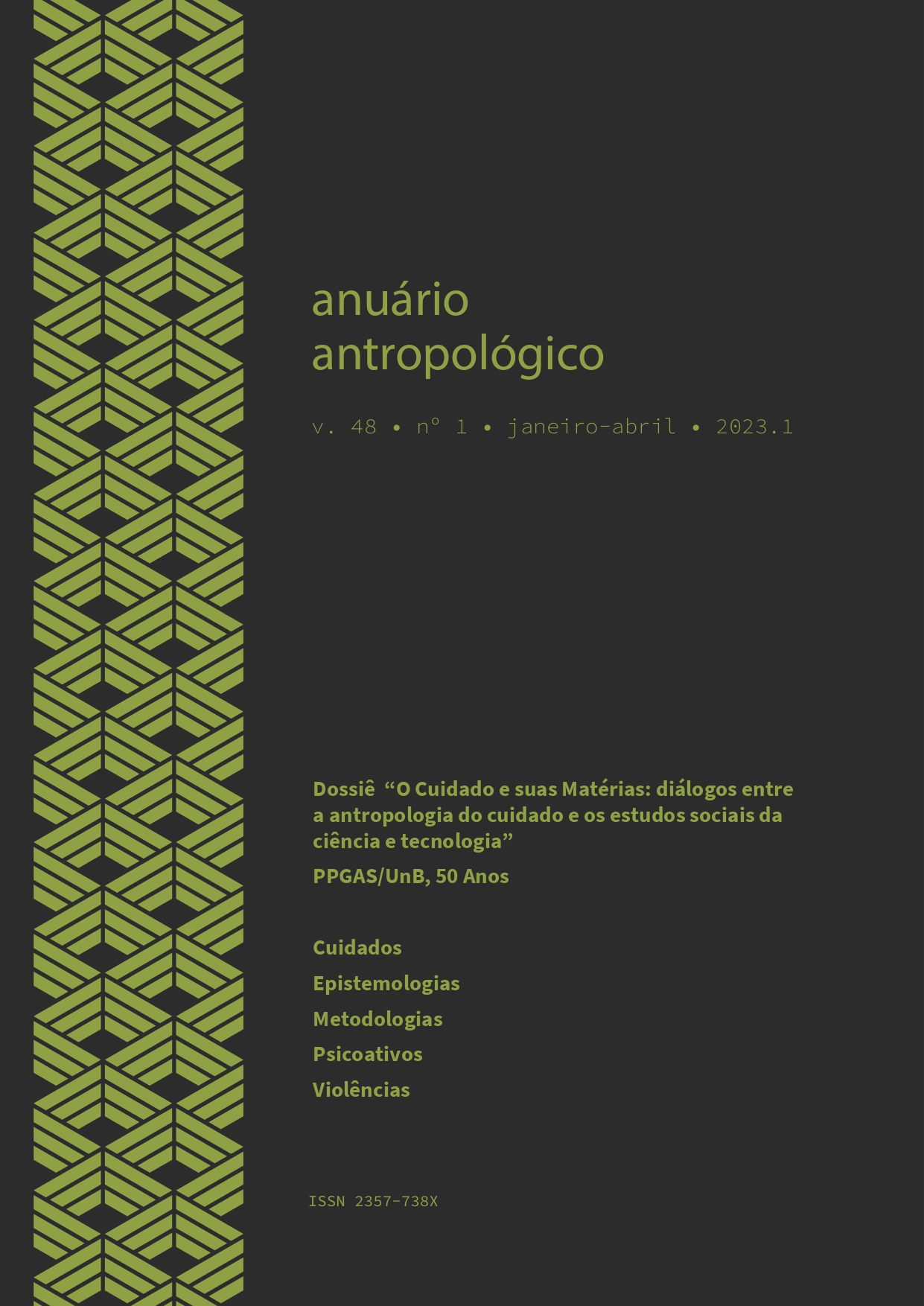“Mother-researcher”: articulations and practicalities in a research on care
DOI:
https://doi.org/10.4000/aa.10621Palavras-chave:
care, mother-researcher, feminist studies, tentacular thinkingResumo
This article proposes to reflect on practices of doing research on care, from the place of a “mother-researcher”, based on an ethnographic experience in a rural Commune located in a settlement in the rural area of Rio Grande do Sul (BR). Inspired by María Puig de la Bellacasa, we consider that ethics of doing research does not live in a “subjective” and difficult-to-access place, but it’s located in daily care practices, crossed by the possibilities of being “touched”, both in the material as well as affective sense. From scenes experienced in the fieldwork, in which being a researcher and a mother provoke a privileged situation, the concepts of “kin” and “touching visions” are rescued in order to perceive the boundaries between “me” and “other” as blurred, enabling relationships, creating reciprocal connections and articulations between being, whether human or not
Downloads
Referências
Carneiro, Rosamaria Giatti. 2020. “Como fica a prática de pesquisa, escrita e ensino das antropólogas depois da maternidade?” Anais da 32RBA: Reunião Brasileira de Antropologia, Rio de Janeiro.
Cassel, Joan. 1987. Children in the field: Anthropological experiences. Philadelphia: Temple University Press.
Cupples, Julie, and Sara Kindon. 2003. “Far from being ‘Home Alone’: The dynamics of accompanied fieldwork”. Journal of Tropical Geography 24(2): 211– 228.
DOI : 10.1111/1467-9493.00153
Haraway, Donna. 1995. “Saberes localizados: a questão da ciência para o feminismo e o privilégio da perspectiva parcial”. Cadernos Pagu, 5: 7–41.
Haraway, Donna. 2009. “Manifesto ciborgue: ciência, tecnologia e feminismo-socialista no final do século XX”. In Antropologia do ciborgue: as vertigens do pós-humano, edited by Hari Kunzru, Donna Haraway, and Tadeu Tomaz, 33–118. Belo Horizonte: Autêntica.
Haraway, Donna. 2016. Staying with the trouble: Making Kin in the Chthulucene. Durham; London: Duke University Press.
Korpela, Mari, Laura Hirvi, and Sanna Tawah. 2016. “Not alone: doing fieldwork in the company of family members”. Suomen Antropologi 41, no. 3: 3–20.
Latimer, Joanna, and Maria Puig de la Bellacasa. 2013. “Re-thinking the ethical: everyday shifts of care in biogerontology”. In Ethics, Law and Society, edited by N. Priaulx, and A. Wrigley, 153–174. Farnham: Ashgate.
Machado, Letícia, Marcelo Perlin, Rossana Soletti, Livia Kmetzch Rosa e Silva, Ida Vanessa Schwartz, Adriana Seixas, Felipe Ricachenevsky, Alessandra Tamajusuku, and Fernanda Stanisçuaski. 2019. "Parent in Science: The impact of parenthood on the scientific career in Brazil”. IEEE/ACM 2nd International Workshop on Gender Equality in Software Engineering (GE), 37–40. Montreal, QC, Canada.
Metzger, Jonathan. 2014. “Spatial planning and/as caring for more-than-human place”. Environment and Planning A 46, no. 5: 1001–1011.
DOI : 10.1068/a140086c
Mol, Annemarie. 2008. The logic of care: health and the problem of patient choice. Taylor & Francis e-Library.
DOI : 10.4324/9780203927076
Puig de la Bellacasa, María. 2017. Matters of care: speculative ethics in more than human worlds. Minneapolis: University of Minnesota Press.
Verani, Alana Pacheco dos Reis. 2022. “Tornando-se mães e antropólogas: uma etnografia sobre experiências que desafiam ideais de maternidade e ciência”. Master dissertation, Universidade Federal de Santa Catarina, Florianópolis.
Downloads
Publicado
Edição
Seção
Licença
Copyright (c) 2023 Anuário Antropológico

Este trabalho está licenciado sob uma licença Creative Commons Attribution-NonCommercial-NoDerivatives 4.0 International License.
https://creativecommons.org/licenses/by/4.0/legalcode.en
Creative Commons - Atribución- 4.0 Internacional - CC BY 4.0
https://creativecommons.org/licenses/by/4.0/legalcode.en



